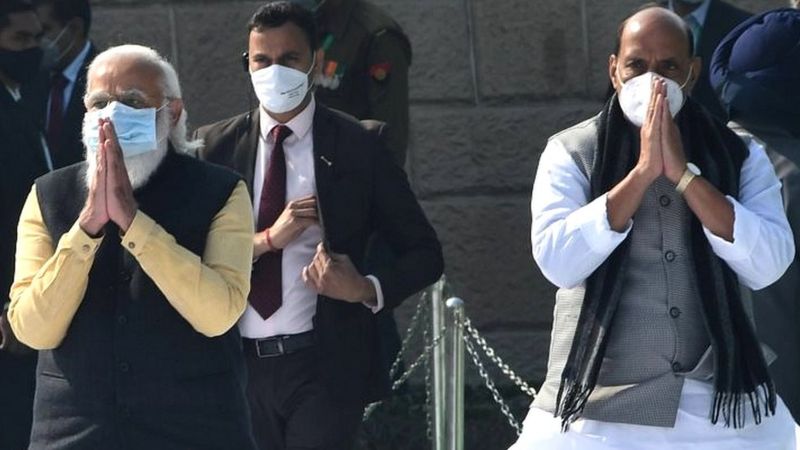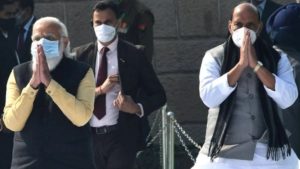
India-China Border Dispute: Whose victory, whose defeat in East-Ladakh agreement with China?

India’s Defense Minister Rajnath Singh on Thursday made a statement in the current situation of East-Ladakh in Parliament.
“I am happy to tell the House that our firm intentions and lasting negotiations have resulted in an army retreat with China on the north and south banks of Pangong Lake,” he said.
There has been tension between the two countries on the Indo-China border (Line of Actual Control) in East-Ladakh for almost ten months.
To resolve this border dispute, there have been nine rounds of high-level military talks between the two countries and in the meantime, the Indian government has been continuously saying that it is trying to restore peace through dialogue.
On Thursday, the Defense Minister gave detailed information about this. Read what he said in Parliament:
I want to tell the House that India has always told China that bilateral relations can develop only with the efforts of both sides. Also, the boundary question can also be resolved through dialogue.
Any adverse situation in peace on the Line of Actual Control has a bad effect on our bilateral dialogue.
During this, several high-level joint statements were also mentioned that maintaining peace on LAC and borders is very important for bilateral relations.
Last year, I informed this House that many areas have been formed in East-Ladakh around the LAC, where there can be a conflict. But our armed forces have also made adequate and effective arrangements for the security of India.
Now I feel proud to say that the Indian forces have steadily faced all these challenges and introduced their valor and bravery to the south and north banks of Pangong Tso Lake.
Making a statement in Rajya Sabha on ‘Present Situation in Eastern Ladakh’. Watch https://t.co/FeTXeH7UPI
— Rajnath Singh (@rajnathsingh) February 11, 2021
The Indian security forces are bravely adamant, guarding the boundaries between the high treacherous hills of Ladakh and several meters of snow, and that is why we hold our position there.
Our forces have also proved this time that they are always ready to fight every challenge in protecting India’s sovereignty and integrity.
For disengagement in conflict zones, India is of the opinion that the forward departments (military deployments) of 2020, which are very close to each other, should go away and both the armies should return to their permanent and recognized posts.
Our strategy and approach for negotiation are based on the guidelines of Prime Minister Narendra Modi that we will not let anyone take our one inch of land. The result of our determination is that we have reached the status of the agreement.
So far, nine rounds of talks have been held at the level of senior commanders. I am happy to tell the House that our approach and negotiations have resulted in an agreement with China for the withdrawal of forces on the north and south end of Pangong Tso Lake.
मैं आश्वस्त हूँ कि यह पूरा सदन, चाहे कोई किसी भी दल का क्यों न हो, देश की संप्रभुता, एकता, अखंडता और सुरक्षा के प्रश्न पर एक साथ खड़ा है और एक स्वर से समर्थन करता है कि यही सन्देश केवल भारत की सीमा तक ही सीमित नहीं रहेगा बल्कि पूरे जगत को जायेगा: रक्षा मंत्री श्री @rajnathsingh
— रक्षा मंत्री कार्यालय/ RMO India (@DefenceMinIndia) February 11, 2021
A disengagement agreement has been reached with China in the area of Pangong Lake, according to which both sides will remove their further military deployment in a phased, coordinated, and authentic manner.
I want to assure this House that we have not lost anything in this conversation. I also want to inform the House that there are still some issues related to deployment and patrolling on the Line of Actual Control. We will especially pay attention to these in further negotiations.
Both sides agree that under bilateral agreements and protocols, both countries should withdraw their forces as soon as possible.
China is also aware of our resolve to protect the sovereignty of the country. It is expected that China will work with us to resolve the remaining issues.
No status quo ante = No peace & tranquility.
Why is GOI insulting the sacrifice of our jawans & letting go of our territory?
— Rahul Gandhi (@RahulGandhi) February 11, 2021
Congress leader Rahul Gandhi wrote on Twitter after Rajnath Singh’s speech, “Not the status quo, not peace. Why is the Indian government humiliating the sacrifice of our soldiers and letting our land go out of hand?”
What does the defense minister’s statement mean?
On social media, a section is describing this agreement as India’s victory over China, but what should be said on the information given by the knowledgeable Defense Minister Rajnath Singh, should be considered.
Anant Krishnan, China correspondent of The Hindu newspaper and who has written a book on India-China relations, wrote on Twitter that “Both countries have compromised. India will be able to patrol Finger 8 while China maintains its dominance till Finger 4”. That is, both countries have taken back their steps. The steps taken by the Government of India regarding the south of Pangong Lake, it seems important, because due to that perhaps both sides could agree on this agreement. “
Indian troops at their base in Finger 3 and Chinese troops remaining east of Finger 8, if implemented, sounds like an eminently reasonable agreement and compromise to me, for now. https://t.co/lO5gRvYYe8
— Ananth Krishnan (@ananthkrishnan) February 11, 2021
Krishnan then wrote that “hoping that India could patrol Finger 8 and that China would retreat altogether would be an over-expected thing, as it was not the case even in April 2020. India’s soldiers Stay in your base on Finger 3 and the Chinese troops stay to the east of Finger 8, if this agreement lands on conscience then in my view it would be a reasonable agreement. “
Foreign affairs expert and senior editor Praveen Swamy has also tweeted his view on this agreement. He wrote, “Proponents will say that it is India’s success that it forced China to retreat northward and take back its land on Pangong Tso Lake. But critics will say that this is not the status quo and India’s land Part of this has gone into the hands of the PLA. But the essence of the information that Defense Minister Rajnath Singh has given on Thursday is that China will place its troops in the North Bank towards the east of Finger 8. Will also keep its army units at its permanent base Dhan Singh Thapa post near Finger 3. Similar action will be taken by both sides in the South Bank area also. These steps will be extended under mutual agreement and whatever construction etc. both sides Has been on the North and South Bank since April 2020,
Money part of @rajnathsingh statement: `.“चीन अपनी सेना की टुकडि़यों को North Bank में Finger 8 के पूरब की दिशा की तरफ रखेगा। इसी तरह भारत भी अपनी सेना की टुकडि़यों को Finger 3 के पास अपने permanent base धन सिंह थापा पोस्ट पर रखेगा।
— Praveen Swami (@praveenswami) February 11, 2021
Praveen Swamy has written that “As per this agreement, the patrolling of traditional places will be temporarily postponed. The patrolling will be started only after further negotiations at the military and diplomatic level, some agreement will be reached. Action on this agreement will start tomorrow. North and South Bank has started. The talks between the two sides will continue on other areas of the border. “
Defense and strategic affairs specialist Brahma Chelani has also tweeted his view on this agreement. He writes, “China’s military has spoken of retreating only from Pangong Lake, while China has also encroached in some other areas including Depsang. Commander-level talks are yet to take place in this area. “
PLA's statement referred to an understanding to disengage from just one sector — the Pangong Lake's "south and north banks." China's territorial encroachments, however, occurred in several sectors, including Depsang — an area that has yet to figure in the corps commanders' talks.
— Brahma Chellaney (@Chellaney) February 11, 2021
“In the statement issued by the Chinese Army, there is no talk of returning to the situation before April 2020. But the Indian media has picked up from the statement of the Chinese Army and the Government of India is in such a trapped state. That even 24 hours after the Chinese Army’s statement comes, there is no statement of the Indian Army, but political rhetoric from the Parliament. “
Similarly, former Indian Army Colonel and defense affairs expert Ajay Shukla has also questioned the declaration related to Pangong.
More lies about “mutual troop withdrawals” in the Pangong sector!
All that’s happened is some armour pullbacks South of Pangong. No change in infantry positions.
And China has been granted right to patrol to Finger 4. That means LAC effectively shifted from Finger 8 to Finger 4
— Ajai Shukla (@ajaishukla) February 10, 2021
He wrote, “Lies are being told about the retreat of forces in the Pengong sector. Some armed vehicles and tanks have been withdrawn. There has been no change in the positions of the troops. China has the right to patrol Finger 4 Has been given. This means that LAC has shifted from finger 8 to finger 4. “
Shukla wrote, “From the very beginning, the real goal of the Chinese army has been to capture Depsang in eastern Ladakh. Not a word was heard about Depsang. For example, the Chinese army has no plan to retreat from Depsang. That’s why the noise is being made on Pangong. “



Average Rating